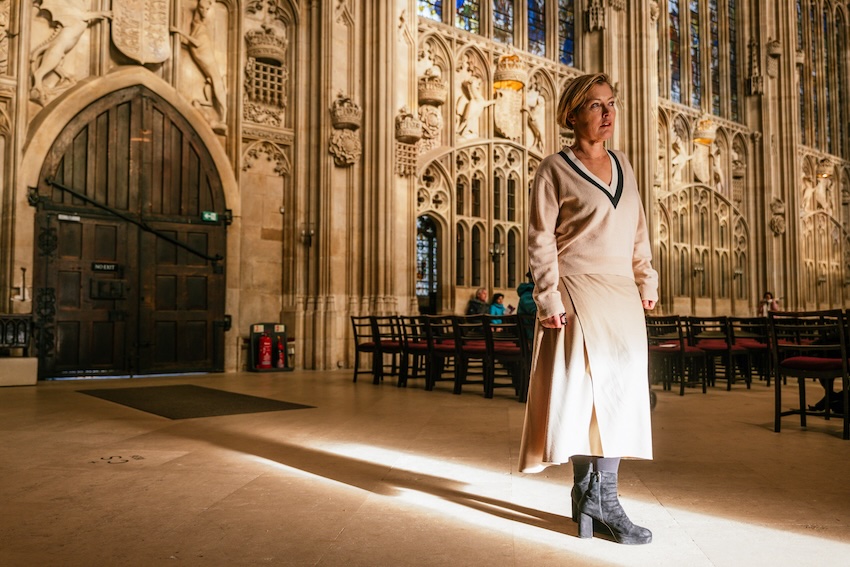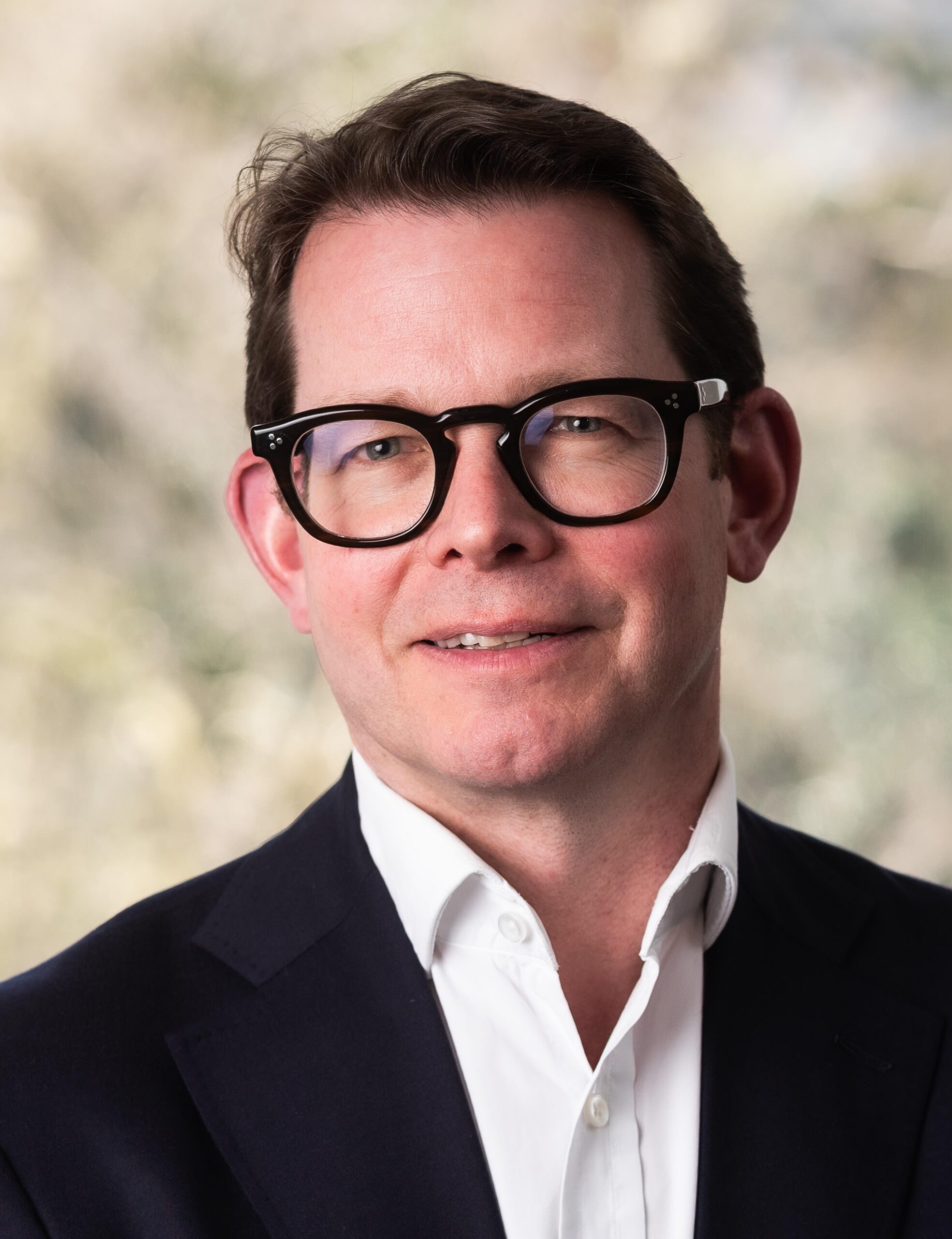Sensing that ESG signaled a lasting shift in the corporate world, she co-founded a Financial Times newsletter called Moral Money. By Charles Pretzlik & Tom Matthew.
In addition to her Financial Times roles, Tett serves as Provost of King’s College, Cambridge, in whose chapel she is shown above.
Gillian Tett, the superstar Financial Times writer and editor, used to respond skeptically to press releases mentioning ESG. In fact, doubtful that companies cared all that much about the environment, society or governance, she would joke that ESG actually stood for “eye-roll, sneer and groan.”
Yet as an anthropologist—Tett holds a PhD in social anthropology from Cambridge—she was skeptical of her skepticism. “One of the first precepts of anthropology is that you shouldn’t view the world through your lens alone. It is beholden on you to see the world through other people’s eyes, both to understand how the world works and to appreciate the limits of your own vision.”
So she attended a few conferences on ESG, where Tett sensed the start of a fundamental shift in the way that business views its purpose—from an exclusive focus on shareholders to a broader concern for stakeholders like employees and the planet. That revelation led Tett to a bit of a transformation of her own. One of financial journalism’s most diligent watchdogs—long before the 2008 financial collapse, Tett raised serious questions about credit default swaps and the like—she co-founded in 2019 the Financial Times newsletter and blog called Moral Money, dedicated to covering “the fast-growing, international shift towards ethical, sustainable and responsible investing.”
US Editor-at-Large for the Financial Times, and a member of its Editorial Board, she also wrote 2021’s Anthro-Vision: A New Way to See in Business and Life. Tett has served as Provost of King’s College, Cambridge, since last October and was awarded an OBE for her services to economic journalism as part of the 2024 New Year Honours.
In a recent visit to Brunswick headquarters in London, Tett said that Moral Money has become the newspaper’s most successful “mini brand.” She spoke before an audience to her former colleague Charles Pretzlik, a Brunswick Partner and former Financial Times Banking Editor.
Moral Money captured a zeitgeist. What insight gave you the vision and confidence to found it?
Much of my career has been about looking for blue sky in the information landscape, things I thought were interesting but that others deemed too geeky or dull to put on the front page.
In 2005, I became obsessed with credit derivatives and credit default swaps, which at the time was a lonely pastime. Until suddenly it exploded.
When it came to ESG and Moral Money, after Donald Trump won the 2016 election, and I was running operations in America for the FT, I started getting loads of emails from PR groups about ESG.
It was irritating because truly the only story that mattered was Trump, Trump, Trump, yet here came this stream of PR about ESG, and frankly it seemed like corporate reputation-washing.
Then one day I finally stopped and thought, “Having been trained as a cultural anthropologist, I should work out why I’m getting this tsunami of irritating emails that I keep deleting.” That’s when I started attending ESG conferences and listening to what people were saying about it.
And I realized that this frenetic email activity was actually one sign of a bigger zeitgeist shift developing in the corporate world. From tunnel vision focused on shareholders and profits, companies were being forced to adopt lateral vision and take stock of their relationship with society.
At the FT, I said I thought we should do something on this big zeitgeist shift. Initially the reaction was pretty negative because, as I say, ESG was generally thought to stand for “eye-roll, sneer and groan.” But then in fact it was Nikkei, our Japanese parent company, who eventually said, “If you feel this strongly about it, here’s a bit of money to start.”
We launched the platform in the summer of 2019, very much on fumes. I brought in a few outside reporters. It was done as an experiment, a pilot to see whether it would work.
We got very lucky because we launched just as the Business Roundtable changed its own mantra from shareholder values to stakeholder-ism, as asset managers began talking about ESG and just before Greta Thunberg terrorized a whole bunch of middle-aged CEOs by campaigning about climate change and making all their kids start to campaign too.
Moral Money went off like a hockey stick, immediately became our best-performing mini brand and remains so today, far and away.
The team at Moral Money is an amazing group that includes reporters like Simon Mundy and Patrick Temple-West. Meanwhile, our parent company, Nikkei, has essentially imported a lot of the ideas of Moral Money and now has a big successful Japanese Moral Money franchise.
From tunnel vision focused on shareholders and profits, companies were being forced to adopt lateral vision and take stock of their relationship with society.
Now, our clients are facing a visceral and intense backlash to ESG. What do you think that means for business and the ESG movement?
It’s not surprising that there’s a backlash. Whenever you get innovation of any sort in finance—be it derivatives, leveraged loans, CLOs or green finance issues—there is extreme opacity, extreme fragmentation, extreme label confusion, because the whole thing’s run like a cottage industry. Inevitably, there’s excess hype.
We’ve seen all that in ESG. We’ve seen ESG advocates be very slow to admit that ESG is not a magic wand. It’s not a free lunch. The idea that you can basically put a bit of ESG in your portfolio and automatically raise returns was always ridiculous.
To be credible, the ESG movement needs to talk urgently about the fact that there are always trade-offs, and often sacrifices. You can’t always magically address the E and the S together to the same degree. I think in many ways there’s a mistake to put them into the same bucket. And data reporting systems are not yet at a point where they are completely unchallengeable. There will always be uncertainty around some of the data reporting.
History also shows that whenever you get any kind of first-world hype, you get a backlash. And we’re seeing that right now, fueled particularly by rising prices of energy, cost of living, et cetera. Yet what I find really interesting is that even the right-wing politicians who say that they hate ESG—they haven’t really formulated an alternative vision to ESG.
I’ve heard nobody saying that we should go back to a very rigid fundamentalist vision of Milton Friedman. Milton Friedman’s ideas about shareholderism emerged at a very specific time in corporate history in America. In that period there was huge respect for authority figures and elites, be that CEOs, politicians or journalists.
In that era, in the 1970s, people still thought the government could do stuff because they’d come out of World War II when government did do stuff. And activists were so convinced that it was up to the government, not companies, to solve social problems that when Rachel Carson launched the whole Silent Spring movement in the 1960s and ’70s around environmentalism in America, she did not even bother to try to talk to companies. She spoke to labor unions and government. And that was it.
Shareholderism emerged at a time of extreme corporate opacity when the only thing that the outside world knew about what companies were doing came from the annual shareholder reports or semi-annual shareholder reports.
Today, you’ve got extreme transparency around companies, rising transparency. You’ve got people finding ways to track emissions all over the place.
Today, you’ve got a real collapse of trust in authority figures and rise of trust in the peer group. And no one trusts government to do stuff. People are increasingly looking to companies and other groups to solve problems instead.
On top of that, you’ve got a world of rising geopolitical hostilities that mean that even on the right, or especially on the right, the relationship between business and society is being renegotiated. And companies are essentially being forced to comply with national security interests in all kinds of ways.
Even companies that hate ESG do not to me seem eager to return to ignoring society at large.
Essentially, you’ve got government being a lot more interventionist on the left and the right. And you have the social contract shifting in quite a fundamental way. As a result, to go back to my point about tunnel vision versus lateral vision, even companies that hate ESG do not to me seem eager to return to ignoring society at large, as Milton Friedman suggested. They understand that they need to look at their footprint in society as a whole.
To cut to the chase, I think companies are in a very difficult situation. At the time we launched Moral Money there was widespread concern about greenwashing, about companies talking about ESG in lieu of actually doing anything. Now, in this era of backlash, we have greenhushing, wherein companies are taking action but not talking about it in public, for fear of political backlash.
The last point I’ll make is that globalization is changing the regulatory framework. We used to talk about globalization creating a regulatory race to the bottom because different jurisdictions would compete to have looser rules to attract companies.
But if you look at what’s happening with green audit right now, you’re actually seeing what I call a “squeeze to the top.” By introducing its rules, Brussels is basically forcing large companies to comply globally because it’s too expensive to have different internal reporting systems.
It’s a bit like GDPR, which came out of Brussels but essentially forced American tech companies to comply. Or what California did with auto emissions, forcing German car companies to comply even though they’re not headquartered in California.
Most large companies, even if they hate ESG, even if they keep praying for Donald Trump to come in and bully the SEC into dropping its own climate reporting rules, most large companies are still going to have to comply, because of reporting requirements in other jurisdictions.
Is too much being expected of companies? Are companies being placed in impossible positions?
Probably society and journalists are expecting too much in terms of thinking that companies should have an answer for every problem or situation. Actually, I think a bit more honesty would probably go a long way. Companies could say, for instance, “We have huge empathy for the pain around X, Y and Z issue, but we don’t think we personally have the tools to solve it.”
Engagement with critics is vital. We may live in an age of transparency where people can get information about all kinds of things. But they can’t always get it in a particularly balanced way. Engaging with people is one way of pursuing that balance.
Additional reporting by Tom Matthew, an Executive in Brunswick’s London office.
More from this issue

The Backlash
Most read from this issue

COP28: What’s Next





